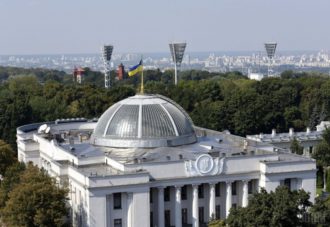With the support of the Centre for Democracy and Rule of Law (CEDEM) the case of Leshchenko v. Ukraine was considered by all instances of national courts and resolved by the European Court of Human Rights.
On January 21, the Court found that a refusal by the Ukrainian authorities to give a journalist access to information on matters of public interest violated his rights under Article 10 ECHR.
Like in the case Centre for Democracy and the Rule of Law v. Ukraine, supported by CEDEM, the Court meticulously and comprehensively examined the “existence of an interference” and highlighted that refusal of access to certain information might be considered an interference with the right to freedom of expression.
Facts
The applicant, Mr. Sergiy Leshchenko, was a journalist well known for his investigative journalism and numerous publications concerning Ukrainian politics. In 2011 he requested from the relevant state administration documents about the sale of the state land to former President of Ukraine Viktor Yanukovych, arguing that it constituted public information. In 2012 he requested from the Constitutional Court of Ukraine application with the Constitutional Court of Ukraine application of the parliament’s members for a review of the constitutionality of the Language Policy Act.
In both cases, state bodies refused to provide the requested documents and argued that these documents were to be considered as confidential, because they concerned the private life of the politicians, or were intended “for internal use”. All appeals in court at the domestic level failed.
So, Mr. Sergiy Leshchenko with the support of the Foundation for the Protection of the Right to Access Information, established by the Media Law Institute (now CEDEM) lodged an application with the European Court complaining that the Ukrainian authorities had denied them access to the information it needed for the effective exercise of its freedom of expression, in breach of Article 10 ECHR.
Judgment
First of all, the Court examined the existence of an interference with reference to the four criteria set out in the Grand Chamber’s judgment in Magyar Helsinki Bizottság v. Hungary:
(1) The purpose of the information request: the applicant has convincingly argued that he needed the information for the purposes of his journalistic work.
(2) The nature of the information sought: the data sought met the public-interest test. The first request concerned the acquisition of formerly public property by the then President of Ukraine, and the second application: the constitutional challenge against the changes in language policy.
(3) The particular role of the seeker of the information in “receiving and imparting” it to the public: the role of the applicant, at the time, as a prominent investigative journalist, is not open to doubt.
(4) Whether the information sought is ready and available: this had been the case.
Therefore, by refusing to disclose to the applicant requested documents, the domestic authorities had impaired its exercise of its freedom to receive and impart information.
Such interference had not been prescribed by law, had not pursued the legitimate aim of protecting the rights of others, and had not been “necessary in a democratic society”. In the first case, specific provision of the Law of Ukraine “On access to public information” prevented there being any restrictions on access to the requested information. In the second case, the Ukrainian authorities had not conducted a balancing exercise as required by the Law of Ukraine “On access to public information” and ECHR – the domestic courts had failed to conduct an exercise, comparing the harm any potential disclosure could do to the politicians’ interest in non-disclosure of this information with the consequences for effective exercise of the applicant’s freedom of expression.
Conclusion: violation in both cases (decided unanimously).

